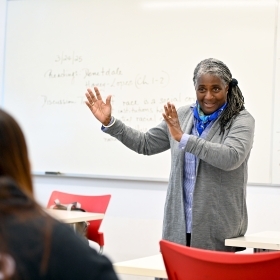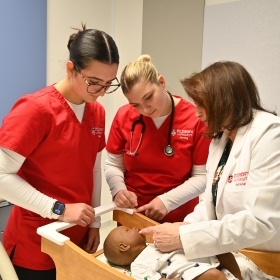Test-Optional: What This Means for College Admissions

Discover the reasons behind the shift to test-optional admissions from the experts at St. John's, and see how this change is influencing the college application process for all students.
Why Are More Colleges Becoming Test-Optional, and What Might This Mean for College Admissions?
Imagine a bright young student struggling with standardized tests, overwhelmed by the ticking clock and the pressure to perform. Despite their creative ideas and deep understanding of complex concepts, their test scores are low and, on paper, may seem unimpressive.
This student might be the next Thomas Edison, whose teachers once labeled him “addled.” Edison’s test results failed to reflect the innovative spirit that would eventually lead to the invention of the lightbulb. Or consider Albert Einstein, who faced early academic challenges and disappointing scores, despite his revolutionary ideas that would forever change our understanding of the universe.
If these extraordinary thinkers had encountered a college admissions process heavily reliant on standardized test performance, their futures could have been drastically altered. While the college admissions process has become increasingly more competitive, standardized tests like the SAT and ACT have long been considered essential.
However, many institutions are now adopting test-optional policies, potentially allowing them to discover their own next Edison or Einstein.
The Test-Optional Trend
Across the nation, an increasing number of universities are ditching standardized test scores, recognizing that a student’s ability and promise cannot always be accurately measured by standardized test scores on the SAT and ACT. These tests were originally designed to provide a uniform assessment of all students’ academic abilities, offering a common yardstick for admission officers to compare applicants from different high schools.
However, this approach has long faced criticism for being inequitable and rooted in racism. Socioeconomic factors, unequal access to test preparation resources, and test anxiety are just a few of the reasons why standardized test scores, particularly those from the SAT and ACT, may not reflect a student’s true potential. A growing number of schools, including St. John’s, have shifted their focus toward a more holistic review of applicants—one that considers not just scores, but a student’s academic journey, character, leadership abilities, and overall college readiness.
Test-Optional Admissions at St. John’s University
The decision for St. John’s to become test optional was rooted in the University’s mission to ensure that education is accessible to all students, regardless of their standardized test performance. St. John’s understands that no two students are the same and that a high test score may not always signify a student’s readiness to succeed in college.
In fact, St. John’s admission process is built around a comprehensive evaluation of each applicant. This approach aligns with the University’s commitment to academic excellence and social justice. Rather than relying heavily on standardized tests, St. John’s application looks at a student’s high school GPA, course rigor, personal statement, extracurricular involvement, and recommendations from
teachers and mentors to build a full picture of who that student is and what they can bring to the campus community.
Why Are Colleges and Universities Choosing to Be Test-Free?
The ongoing decision by St. John’s and other institutions to remain test-free reflects an understanding that standardized tests are not always the best measure of a student’s potential. By staying test-optional, schools send a clear message: they value diverse perspectives and recognize that students come from varying educational, cultural, and socioeconomic backgrounds. Many students excel in the classroom, but may not perform as well in the high-pressure environment of standardized testing. For these students, being able to apply without test scores removes a major barrier to higher education and allows them to focus on what truly matters—their accomplishments, strengths, and passions.
For a school like St. John’s, maintaining this flexibility does not mean lowering academic standards. On the contrary, it reflects the University’s desire to foster a student body rich in talent, experience, and motivation. Whether a student chooses to submit their SAT and ACT test scores or not, the University’s admissions team is dedicated to finding those individuals who will thrive in their unique learning environment.
What Test Optional Means for Prospective Students
The test-optional policy at St. John’s is more than just an admission strategy—it’s a reflection of the kind of academic environment students can expect once they’re on campus. St. John’s is dedicated to fostering a community that values hard work, creativity, and individual growth. By embracing a test-optional policy, the University opens its doors to students who may not fit a traditional mold, but possess the qualities and determination necessary to succeed. Students at St. John’s come from a wide range of backgrounds, and each one brings something valuable to the table. By focusing on factors like academic achievement, leadership, community involvement, and personal character, the University ensures its student body is not only academically prepared, but also ready to contribute to the vibrant, diverse campus culture.
What Matters Most When Applying to College
For students considering St. John’s University, understanding which aspects of the application will carry the most weight is crucial. While test scores are optional, St. John’s employs a holistic approach to reviewing applications, evaluating several key factors:
Academic Performance
A strong high school GPA, particularly in rigorous courses such as Advanced Placement (AP) or International Baccalaureate (IB), serves as one of the most significant indicators of college readiness. Studies show that GPA is often a better predictor of college success than standardized test scores.
Personal Statement
St. John’s encourages students to share their unique stories through their personal statement. This narrative allows applicants to highlight their experiences, aspirations, and motivations for wanting to attend the University. Research suggests that a compelling personal narrative can enhance an application significantly.
Extracurricular Activities
Leadership roles, community service, and involvement in clubs or sports demonstrate a student’s commitment and ability to balance responsibilities beyond academics. According to the National Association for College Admission Counseling, colleges value students who contribute to their communities, as it indicates character and initiative.
Letters of Recommendation
These letters provide insight into a student’s character and work ethic from those who know them best—teachers, mentors, and counselors. Recommendations that speak to a student’s resilience and personal qualities can strongly influence admission decisions.
Interviews (if applicable)
Some applicants may have the opportunity to interview with admission staff or faculty. This personal interaction allows students to express their passions and showcase their fit with the University’s culture.
By prioritizing these elements over standardized test scores, St. John’s fosters an admissions process that seeks well-rounded individuals who demonstrate strong college readiness skills and the ability to thrive in its academic environment.

Why Test Scores Don’t Define Your College Future
At St. John’s University, we understand that every student has a unique story to tell. That’s why we’ve embraced a test-optional policy, focusing on what makes each applicant special. We’re not just looking for numbers; we want to discover the next great innovator or leader, just like Edison and Einstein.







